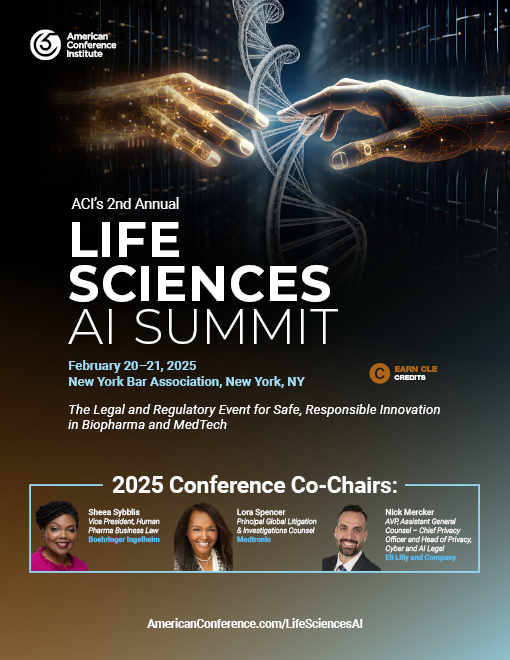Agenda

Flip through our conference brochure and discover what’s new this year.
Download Brochure
Pre-Conference Workshops
February 19, 2025
Day 1
February 20, 2025
Registration and Continental Breakfast

Rama G. ElluruSenior DirectorSpecial Competitive Studies Project – SCSP

Susan KrumplitschPartnerDLA Piper

Brendan CarrollPartnerAlston & Bird
This opening session provides a big-picture reflection on the past year’s pivotal events in AI for the life sciences and sets the stage for the summit. Topics of discussion include:
- Examining key advancements in 2024 that transformed AI’s role in the life sciences, and set the stage for breakthroughs in drug discovery, clinical trials, and personalized medicine
- Analyzing global regulatory shifts and their influence on AI adoption in life sciences, with highlights of FDA and EMA progress
- Speculating on the potential impacts of a second Trump administration, including shifts in AI governance, data privacy policies, and global partnerships
- Exploring economic pressures like inflation and trade policies that influenced AI integration and investment decisions in the life sciences sector

Amanda J. KlingerPartnerKing & Spalding LLP

Rosemarie PurcellDirector, Global Regulatory Policy & InnovationTakeda
This session will focus on how the FDA and EMA are shaping AI in life sciences, providing a roadmap for companies to meet evolving regulatory standards. Topics of discuss will include:
- Navigating FDA guidance on AI medical devices, including Predetermined Change Control Plans (PCCPs) and clinical decision support software.
- Exploring EMA alignment with the EU AI Act and its regulations for AI in the life sciences
- Examining case studies showing how companies navigate FDA and EMA directives
- Comparing key differences and similarities between FDA and EMA AI regulations
Morning Networking Break
AI Litigation and Enforcement Risks Across the Life Sciences Product Lifecycle: From Pre-Commercialization to Post-Market

Mark SentenacPartnerKing & Spalding LLP

Jackie StanleySenior Compliance Counsel, Responsible AI/Digital Health Pfizer

Jim FrederickCounselFaegre Drinker Biddle & Reath LLP
This session focuses on the potential litigation challenges arising throughout the lifecycle of AI-driven products in the life sciences sector. By examining legal risks from R&D to post-market, attendees will gain actionable insights into litigation strategies and how to mitigate risks in real-time. Topics of discussion will include:
- Clarifying product liability in cases of AI errors during commercialization, and how fault is determined under current legal frameworks
- Managing data privacy litigation risks, particularly concerning patient data misuse during AI-powered clinical trials
- Navigating post-commercialization legal risks, including real-time performance monitoring, algorithm failures, and regulatory non-compliance
- Exploring recent case law surrounding AI-generated content and proprietary algorithms, including practical litigation strategies for life sciences companies

Peter A. BlenkinsopPartnerFaegre Drinker Biddle & Reath LLP

Brigid DeCoursey BondocPartnerMorrison Foerster

Charlene ChoDirector and Corporate Counsel, Digital and Technology LawThermo Fisher Scientific

Kevin FumaiAssistant General CounselOracle
Regulatory sandboxes not only provide a controlled environment to test the viability of innovative products and services but also may yield learnings about technical standards, review policies and risk management. During this session, panelists will explore how regulatory sandboxes in the life sciences can promote innovation, help identify risks, and foster global collaborations. Topics of discussion will include:
- Basic features of a regulatory sandbox
- History of regulatory sandbox use
- Laws relating to regulatory sandboxes
- Ethical issues of AI-testing in sandboxes
- Best practices and key takeaways
Networking Luncheon
Sponsored by 

RuiHui (Rachel) YuPartnerSullivan & Cromwell LLP

Ellen GilleyLead Counsel | R&D Legal - Data & TechnologyTakeda
This session considers the unique capabilities of generative AI in life sciences, particularly in drug discovery, personalized medicine, and synthetic biology. Topics of discussion will include:
- Understanding how generative AI is being used to create novel compounds, optimize molecular structures, and reduce the time needed for R&D
- Using generative AI to develop individualized treatment plans and predict patient responses to therapies
- Addressing the legal and regulatory hurdles specific to generative AI in these areas, and how companies are managing these complexities in line with FDA and EMA guidelines
- Examining the ethical concerns around using AI to create synthetic biology, potential risks of generating novel compounds, and ensuring patient safety
Afternoon Networking Break
IP Protections for AI-Driven Innovations: Navigating Ownership and Inventorship Challenges in the Life Sciences

Hans SauerDeputy General Counsel, VP for IPBiotechnology Industry Organization (BIO)

John NappiAssistant General CounselPhRMA

Benjamin C. HsingPartnerVenable LLP

Michael B. HarlinPartnerNeal, Gerber & Eisenberg LLP

Sharick NaqiPrincipal IP Counsel, IP Lead, AI & Digital Novartis
As AI becomes integral to innovation in the life sciences, it creates complexities in IP law. Understanding how to protect AI-driven discoveries while navigating uncertainties of inventorship and ownership is mission critical for staying ahead in this rapidly evolving landscape. Topics of discussion will include:
- Evaluating patentability and the boundaries of IP protection for AI-generated innovations
- Determining ownership rights when AI contributes to the inventive process
- Addressing joint ownership scenarios and the impact on licensing agreements
- Mitigating infringement risks when AI uses existing IP for training
- Distinguishing between proprietary data used for AI training and AI-generated datasets, assessing copyright and data ownership risks

Rosemarie PurcellDirector, Global Regulatory Policy & InnovationTakeda

Eric MerinAssistant General Counsel, Regulatory LawBristol Myers Squibb

Lisa LeCointe-CephasPartner, Compliance & InvestigationsDLA Piper LLP
This session will explore cutting-edge applications of AI to optimize trial design, improve data management, and navigate the regulatory landscape. Topics of discussion will include:
- Using AI to enhance trial design, boost recruitment with synthetic data, and address biases for more diverse and fair trial population
- Implementing FDA guidance on Clinical Decision Support Software while ensuring data management consistency and reducing errors
- Exploring the legal and ethical challenges of AI in patient engagement, from recruitment through participation
- Leveraging AI-driven post-trial analysis for more efficient regulatory submissions and accuracy in reporting
- Understanding the FDA and EMA’s evolving regulations on AI tools, including new rules for AI in clinical trials
Closing Remarks Cocktail Reception
Conference Adjourns to Day Two
Day 2
February 21, 2025
Registration and Continental Breakfast
Forging Strategic AI Partnerships in the Life Sciences: Building Success from Research to Implementation

Kenneth N. RashbaumPartnerBarton LLP

Michelle A. SchaapMember
Chair, Tech, Privacy and Data InnovationsChiesa Shahinian & Giantomasi LLP

Kurt JohnChief Information Security OfficerCon Edison
This session will explore how to create and manage AI collaborations that not only advance research but also translate into real-world clinical outcomes. Topics of discussion will include:
Building seamless AI partnerships that bridge research and clinical use, driving real-world innovation in diagnostics, drug discovery, and personalized care. Topics of discussion will include:
- Mastering collaboration challenges such as data sharing, model deployment, and regulatory compliance
- Avoiding common pitfalls like misaligned goals, data privacy issues, and technical barriers
- Crafting agreements that prioritize patient safety, data security, and ethical AI practices
- Ensuring post-partnership success by integrating AI solutions into clinical workflows
- Addressing technical challenges like system compatibility
Morning Networking Break
Navigating Data Privacy Challenges and AI in the Life Sciences: A Global Roadmap for the Digital Age

Daniel FisherDirector, Digital & DataMerck

Nancy L. PerkinsCounsel Arnold & Porter Kaye Scholer LLP

Joanne CharlesAssociate General CounselGilead Sciences
This panel will guide attendees through the rapidly evolving intersection of privacy and AI regulations with a lens towards the life sciences industry in the U.S. and E.U. It will offer current insights into developments in these complex landscapes and aim to provide practical solutions on how to design a compliant, responsible, and ethical AI program that appropriately uses personal information. Topics will include:
- The importance of AI capabilities to the life sciences industry
- Recent trends, laws, and advisory opinions on the intersection of state & federal privacy and AI in the U.S.
- Navigating consent and the complex evolution of personal information, sensitive personal information, consumer health data, biometric data, and genetic data
- Recent trends, laws, and opinions on the intersection of privacy and AI in the E.U.
- Compounding privacy issues specific to AI: bias, discrimination, transparency, purposes limitation and necessity, risk monitoring, mitigation, security and documentation
- Establishing a privacy and AI-compliant governance framework and policies supportive thereof
Networking Luncheon
Spotlight on Healthcare
Revolutionizing Healthcare: AI’s Transformative Role in Digital Health Technologies and Software Medicines

Melissa K. BianchIPartnerHogan Lovells US LLP

Patrice EttingerVice President, Chief Privacy OfficerRegeneron

James A. BoianiShareholderEpstein Becker & Green PC
This session will explore how AI innovations are driving the development of software-based treatments while aligning with evolving regulatory frameworks – topics of discussion will include:
- Examining how AI-powered patient monitoring is transforming remote healthcare
- Understanding AI’s impact on wearables, predictive analytics, and personalized patient care
- Addressing concerns about AI in patient data management and navigating regulatory requirements
- Decoding FDA’s evolving stance on AI-integrated software as a medical device (SaMD)
- Considering the ethical and regulatory implications of AI’s advancing diagnostic capabilities

Betsy GreytokVice President & Associate General Counsel, Foundational ModelsIBM

Danny TobeyPartner, Global Co-Chair and Chair, Americas AI and Data Analytics PracticeDLA Piper LLP
AI has transformed clinical decision-making, but it also introduces significant risks, including data privacy concerns, regulatory challenges, and potential bias in treatment decisions. This session explores both the benefits and dangers of AI-powered healthcare. Topics of discussion will include:
- Improving clinical decision-making with AI, enhancing speed, accuracy, and data-driven treatment options
- Navigating FDA guidelines and implementing post-market surveillance for continuous AI system updates
- Transforming medical imaging and precision medicine, enabling personalized treatments and reducing errors
- Addressing data privacy concerns while ensuring robust datasets for effective AI model training
- Overcoming barriers to AI integration in healthcare systems while ensuring regulatory compliance and patient outcomes

Huong NguyenFormer GC and Compliance Officer Fosun Pharma USA Inc.

Tim SwanPartnerBakerHostetler

Sheea SybblisVice President, Human Pharma Business LawBoehringer Ingelheim
As AI becomes more embedded in life sciences accountability is essential to promote ethical applications. Topics of discussion will include:
- Tackling AI ethics in drug development, clinical trials, and diagnostics
- Addressing data collection to algorithm design and ethics
- Evaluating potential considerations and impact of the EU AI Act on transparency and accountability
- Balancing ethical considerations and real-world challenges around AI decisions
